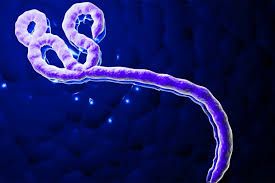
Alphonso Toweh, of Reuters reports the latest update from Liberian health authorities confirm two cases of Ebola: WHO, and left 70 dead in Guinea.
Eleven deaths in towns in northern Sierra Leone and Liberia, which shares borders with southeastern Guinea where the outbreak was first reported, are suspected to be linked to Ebola.
"Two of those samples have tested positive for the ebolavirus," the global health organization said in the statement on its website on Sunday, confirming for the first time the cases in country.
The suspected spread of disease into Liberia and Sierra Leone has stirred concern that one of the most lethal infectious diseases known to man could spread in a poor corner of West Africa, where health systems are ill-equipped to cope.
Authorities in Guinea's northwestern neighbor Senegal closed its land border on Saturday and suspended weekly markets near the borders where fresh produce from Guinea were sold in order to prevent the spread of the Ebola virus.
Below the fold are some background article from my March 24 post here announcing this epidemic for those of you who missed it.
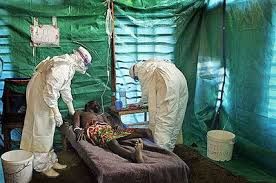
Update: Bloomberg is now reporting that Africa's largest outbreak of Ebola in seven years is now thought have spread from Guinea to Liberia. The report below develops chronologically from this afternoon. This is a fast breaking story. (See updates below to skip to current news.)
The latest Associated Press report from Conakry, capital of Guinea, Officials Rush to Contain Ebola Virus in Guinea clarifies an earlier report this morning which I pulled down after some confusion. Thanks to Wisper, Tortured Illogic, Iberian, and Jan4insight for helping to put together this better version. Some of their many contributions are noted below.
This morning, our own UN Dispatcher broke the story of Ebola Outbreak in Guinea, linking to a CNN story, At least 59 people dead in Guinea Ebola outbreak. Although nearly all reports on Google, including mine this morning, reported this as an Ebola outbreak, Whisper was the first to alert us to a story breaking later this morning that the Pasteur Institute was unable to identify Ebola in the samples they worked with over night. After going back to check, I noticed that even though the CNN story's title mentions an Ebola outbreak, its content says the disease is still unverified.
CNN reports At least 59 people dead in Guinea Ebola outbreak.
Experts in the country had been unable to identify the disease, whose symptoms -- diarrhea, vomiting and fever -- were first observed last month.
Health Minister Remy Lamah said Saturday initial test results confirm the presence of a viral hemorrhagic fever, which according to the U.S. Centers for Disease Control and Prevention refers to a group of viruses that affect multiple organ systems in the body.
The Guinean Health Ministry warned that the disease is mainly spread from infected people, from objects belonging to ill or dead people, and by the consumption of meat from animals in the bush. ... "Isolation units are essential to prevent the spread of the disease, which is highly contagious,"
(Update: Reminder - this text is from the post this afternoon. It is now confirmed that Ebola is definitely in Guinea, but not yet in the capital of Conakry.)
What I now think from reading the Pasteur Institute sent to us by Wisper more carefully, is an Ebola epidemic has been identified in remote parts of Guinea, and even may have spread to Sierra Leone, that has killed 59 of 86 people exposed, but that no cases of Ebola have been identified from cases of people who have died in capital city Conakry. Tortured Illogic is correct about this, and I owe him thanks for spotting this error in my first post, which is why I took it down. It has taken me four hours to get this far in figuring this out this possible theory. But, there may be a second kind of a hemorrhagic-like illness in the capital that sample were taken from the patents with suspect symptoms. Just to be 100% safe, I'm going to keep the more cautious title, even though at least 3 dozen major outlets are all reporting this a confirmed Ebola.

From Guinea scrambles to contain deadly Ebola outbreak:
Conakry (AFP) - Aid workers and health officials battled Monday to contain west Africa's first outbreak of the deadly Ebola virus as tests on suspected cases in Conakry allayed fears that it had spread to the Guinean capital.
At least 59 people have died in an outbreak of the virulent virus raging through Guinea's southern forests but tests on three haemorrhagic fever cases -- two of them fatal -- in Conakry were negative, the government said.
"The Pasteur Institute in Dakar worked urgently all last night on samples taken from suspected cases here in Conakry, which were all negative," said Sakoba Keita, the health ministry's chief disease prevention officer.
"So for now, there's no Ebola in Conakry, but haemorrhagic fever whose nature remains to be determined."
Sorry for the length of this article but I want to clarify, what happened here.
This is the quote that caused me to say this morning, apparently in error that Ebola spread "from the south to Conakry."
The UN Children's Fund (UNICEF) said in a statement on Sunday the Ebola virus had quickly spread from the south to Conakry.
There have been 86 cases of Ebola with 56 death in other parts of Guinea, with reports in the last few hours that it may have spread into regions of Sierra Leone.
Time Magazine provides more details in A Terrifying Ebola Outbreak in West Africa Is Spreading Fast. Ebola epidemics are of special concern because there are no known treatments or vaccines and the virus kill up to 90 percent of those infected. 59 out 80 exposed have died so far.
There are no known treatments or vaccines for Ebola, a viral hemorrhagic fever that kills up to 90 percent of those who become infected, depending on the strain of the virus. The virus is spread through direct contact with blood, feces or sweat, by sexual contact or unprotected handling of contaminated corpses. First discovered in the Democratic Republic of Congo in 1976, the disease has spread in several outbreaks, mainly in sub-Saharan Africa.
“This outbreak is particularly devastating because medical staff are among the first victims … hindering the response and threatening normal care in a country already lacking in medical personnel,” UNICEF said.
The organization has sent five tons of aid to the country’s most affected regions, and has urged Guineans not to attend funerals when possible and to avoid all contact with the sick and the dead.
A special challenge in this region are the tribal funeral customs of touching the dead to show affection.
And, finally, the most recent from ABC news Officials Rush to Contain Ebola Virus in Guinea.
Africa's largest outbreak of Ebola in seven years now suspected of spreading to Liberia (updated)
The Ebola virus leads to severe hemorrhagic fever in its victims and has no vaccine or specific treatment. The new cases in Guinea mark the first time in 20 years that an outbreak of the virus has been reported in West Africa.
"The Ebola fever is one of the most virulent diseases known to mankind with a fatality rate up to 90 percent," said Ibrahima Toure, Guinea's country director for the aid group Plan International.
"Communities in the affected region stretch across the borders and people move freely within this area. This poses a serious risk of the epidemic becoming widespread with devastating consequences," he said.
In Guinea, efforts were underway to keep the virus from reaching the capital of Conakry, home to some 3 million people. Panic erupted Sunday amid reports that two of the deaths had occurred in the capital. However, on Monday authorities said that those cases were only under investigation and later proved not to be positive for the virus.
Our hopes and prayers our with the victims and their loved ones. Let's hope they contain and control this outbreak as soon as possible.
Of special interest to us as Democrats is that outbreaks such as this highlight the need for local, national, and even international governmental responses to act as agents of the collective good. Guinea deserves praise that all medical services are being provided free in this case. Imagine that they had a health care system like ours, where uninsured patients were hesitant to call ambulances or report symptoms for fear of costs that might leave them bankrupt.
Public health responses during epidemics are best handled by government looking out for the best interests of all of our people, not by for-profit companies catering only to their clients who can pay for their services. Where would we be now if we had not invested in developing the capabilities of the World Health Organization, Centers for Disease Control and other kinds of public and global health organizations the Republicans want to cut?
Sun Mar 30, 2014 at 10:50 PM PT: Here are some snippets of another one of my previous Ebola posts the vast overwhelming majority of you missed because you still don't follow me. Where else can you get recipe's for such as tasty Bat Soup just before it will likely be banned. This could be you last chance folks. These are the kind of unique reports you are missing if you are not following me.
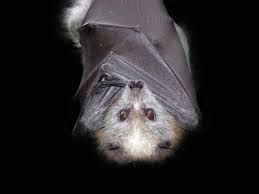
The BBC is reporting that scientists have finally discovered that bats are the hidden reservoir and transmission vector for spreading Ebola, as reported, in Guinea Ebola outbreak: Bat-eating banned to curb virus.
Guinea has banned the sale and consumption of bats to prevent the spread of the deadly Ebola virus, its health minister has said. ... Bats, a local delicacy, appeared to be the "main agents" for the Ebola outbreak in the south, Rene Lamah said.
Sixty-two people have now been killed by the virus in Guinea, with suspected cases reported in neighbouring Liberia and Sierra Leone. ... Ebola is spread by close contact. There is no known cure or vaccine. ... It kills between 25% and 90% of victims, depending on the strain of the virus, according to the World Health Organization (WHO).
People who eat the animals often boil them into a sort of spicy pepper soup, our correspondent says. The soup is sold in village stores where people gather to drink alcohol. ... Other ways of preparing the bats to eat include drying them over a fire.
The total number of deaths had reached 62 by Tuesday. Ebola is spread by contact with bodily fluids, or by touching an object recently touched by an infected person. The virus attacks the endothelial cells of the blood vessels. It takes 2 to 21 days from infection to come down with symptoms and people then can die withing days.
Two quarantine zones have been set up in southern Guinea to try to contain the outbreak. Mediecins Sans Fronieres, the World Health Organization, are providing assistance to local governments in trying to contain the epidemic.
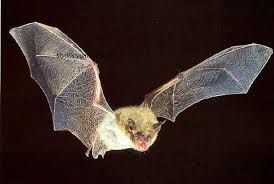
The discovery of the bat vector has solved a puzzle that has baffled science for decades because Ebola kills off it victims so quickly it disappears for long periods so we have never known where its reservoir was. While hosting the virus the bat shows no symptoms of the disease. Livescience reports, Bat Soup Blamed as Deadly Ebola Virus Spreads.
"We discovered the vector [infectious] agent of the Ebola virus is the bat," Remy Lamah, the country’s health minister, told Bloomberg News. "We sent messages everywhere to announce the ban. People must even avoid consumption of rats and monkeys. They are very dangerous animals."
Bats are reported to be quite tasty when toasted over an open grill, or boiled down into a think and spicy soup with peppers. Mmm, mmm, good! I'm getting hungry. If it weren't for my big diet weigh in tomorrow I'd have some now. I'm down 7 pounds for the month, and don't want to go on a binge. Below the fold I offer one old American favorite bat soup recipe for the more adventuress Kossacks, although you may want to read the warning below first.
Though many animals can spread disease, bats have come under increased scientific scrutiny in recent years for their uncanny ability to host "zoonotic" viruses, that is, viruses that readily make the jump from one species to another.
"There seems to be something different about bats in terms of being able to host zoonotic infections," David Hayman, a wildlife epidemiologist at Colorado State University, told LiveScience in a 2013 interview.
The flying mammals are reservoirs for more than 60 viruses that can infect humans, and host more viruses per species than even rodents.
In addition to the Ebola virus, rabies, histoplasmosis, SARS, Nipah (which causes deadly brain fevers), Hendra (a lethal respiratory disease), Marburg, Lyssaviruses and other diseases can be spread by bats, according to the Center for Disease Control and Prevention (CDC).
One disappointing aspect of these articles is that scientist never explain to us why the custom of eating these tasty bat delicacies never spread to Europe, and the United States, leaving the reader with a puzzled empty feeling. But don't worry, to fill up that emptiness I found an American recipe for a delicious bat soup from an out of print soup. This might be your last chance to have it before it gets banned here too. Oddly, the author, and all of her descendents, as well as children, and publisher have all pasted on, but Ted Taylor and Fred Peters found an old copy in the New York Library which I've put below the fold. (Humor alert!)
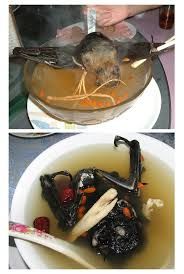
Here's a tasty recipe for Fruit Bat Soup from "The New York Times Natural Foods Cookbook" by Jean Hewitt (c) 1971. (Out of Print) Courtesy of Ted Taylor who says fruit bats are also known as Flying Foxes who are affectionate little creatures who make great pets, with the advantage that you can make a tasty soup with them when you done playing.
Fruit Bat Soup</>
3 Fruit bats, well washed but neither skinned nor eviscerated,
Water
1 tb Finely sliced fresh ginger,
1 lg Onion, quartered,
The following is a genuine recipe from Micronesia. Fruit bats, or flying foxes, are furry, fruit and nectar eating bats about the size of small rabbits. The make very affectionate pets.
Sea salt to taste, Chopped scallions, Soy sauce and/or coconut cream.
1. Place the bats in a large kettle and add water to cover, the ginger, onion, and salt. Bring to the boil and cook for 40 minutes. Strain broth into a second kettle.
2. Take the bats, skin them and discard the skin. Remove meat from the bones and return meat, and any of the viscera you fancy, to the broth. Heat.
3. Serve liberally sprinkled with scallions and further seasoned with soy sauce and/or coconut cream.
Yield: 4 servings.
Mmmm, mmm! That looks like some mighty fine eating there. Unfortunately, I'm allergic to bats, but please write in and let me know how it tastes. Just remember to have your bats checked for Ebola virus, rabies, histoplasmosis, SARS, Nipah (which causes deadly brain fevers), Hendra (a lethal respiratory disease), Marburg, Lyssaviruses first. Enjoy!.
7:43 AM PT: May I call your attention to what I believe to be an important proposal for a more positive and energetic approach to supporting and appreciating our Daily Kos volunteer writers and readers who comment in
Striving towards a more nurturing, generous, supportive, fun, and successful writing culture (poll)


